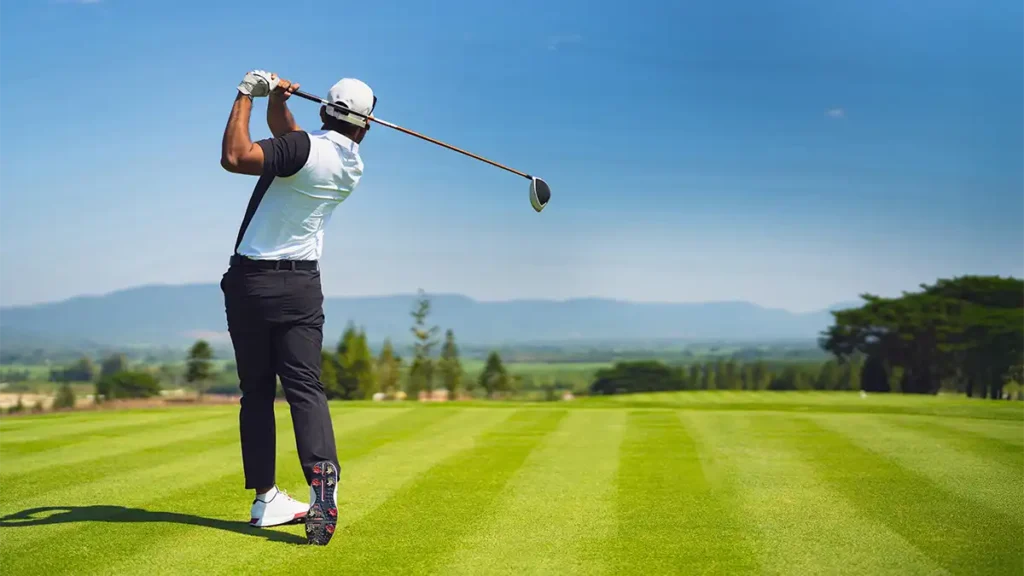Six Aussie golfers – in their own words – on how the COVID-19 pandemic upended their lives and businesses, and provided opportunities they never thought were possible.
Brent Siroen
Captain, The Vines Resort & Country Club, Perth
The first Australian to die from coronavirus on February 29 was James Kwan. A 30-year member at The Vines Resort & Country Club in Perth, Mr Kwan fell ill while on the Diamond Princess cruise ship that was touring around Japan and passed away upon his return to Perth at age 78. Renowned for his promotion of golf tourism between WA and Asia, Mr Kwan was a popular member who regularly hosted golf tours for members into Asia.
I actually didn’t know that James was away at the time. He had been ill for a number of years, but when I saw him two months prior to leaving for the cruise he looked well if not still a little bit weak. But he was out playing golf and he obviously thought he was well enough to travel; unfortunately he was just in the wrong place at the wrong time.
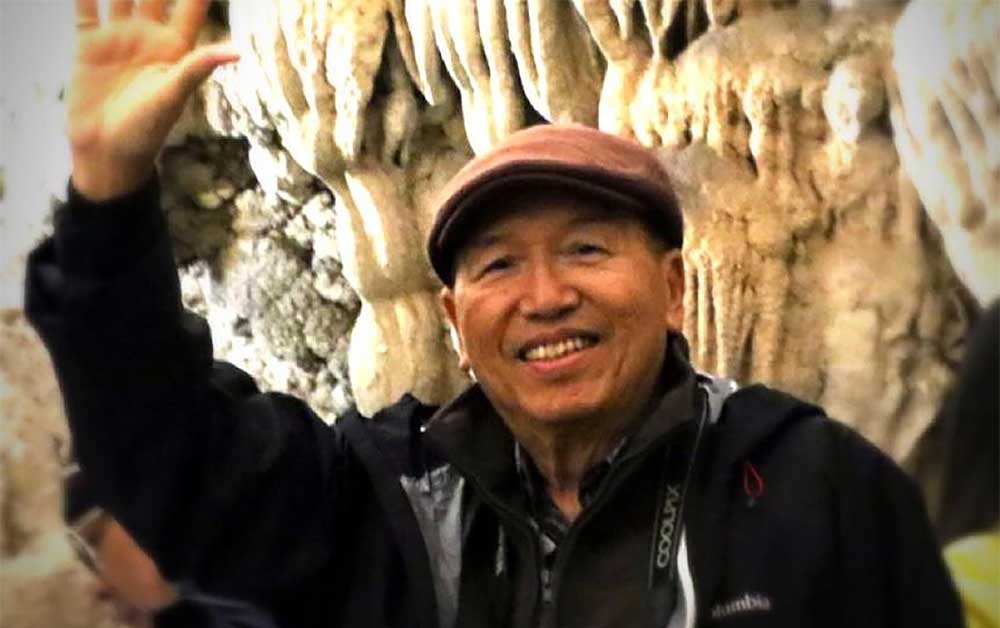
I found out from another member that he was ill with the coronavirus and that came as a shock. Then when we found out that he had passed, the whole club was in shock, made worse by the fact that the virus had just started and he was the first person in Australia to die from it. It was a shock to everybody. A lot of people knew him around the club so it sent a real sombre feeling throughout.
When James passed, his wife Theresa, his son Edwin and his daughter-in-law Gillian were all still in hospital. Theresa was here in Perth, his son was in Japan and his wife was in Darwin. Our thoughts then turned to whether Theresa and the rest of the family were going to be OK.
Once they all arrived back in Perth, they spent another 14 days in self-isolation and they used that time to organise a private funeral service for James.
That’s been the hardest part – and why you feel so much for the family and friends. Because of the virus still going on, you can’t have 100 people at a funeral and you can’t have a wake. As a club we haven’t had the opportunity yet to properly pay tribute to James and two other members who have passed recently, Karl Wolpers and Masamichi ‘Mick’ Umezumi. Between the three of them they had 80 years of membership at The Vines. That’s why we need to get together and pay tribute to all three back at the club once some normalcy returns to life.
James joined The Vines in 1989 not long after it opened and he and his family lived beside the first fairway. He and Theresa both played regularly with their group of mates.
He was the type of guy who didn’t say a lot but when he did say something it was funny. He had a very good sense of humour and was quite witty. He was a very well-mannered person, very well spoken. He was certainly very much loved around the golf club. He kept to himself a little bit. He wasn’t really an outgoing person; he just loved his golf and loved his friends and the camaraderie around the club.
Because he was heavily involved in the travel industry, he organised quite a few golf trips for members throughout Asia and I went on a couple with him. They were certainly great trips and that will be one of the great memories that most members will have of James, the trips they did with him.
He used to sponsor a day at the club called the Asian Connection Day, which we would hold once a year on a Sunday. After golf we would go up to one of the rooms in the resort and there would be Asian-themed food, singing; there might have been a bit of karaoke. And everyone walked out with a prize. If you won the day it was an overseas trip with airfares, accommodation and golf. One year I won a nearest-the-pin and got a sports car hire for the weekend and a night’s accommodation at Crown Casino. That’s a $500 prize for a nearest-the-pin. You should have seen the prize table; the room almost wasn’t big enough to fit all the prizes in there.
The club is going to bring that day back. It won’t be anywhere near as big as what James put on, but we think that is a nice event to bring back in memory of James.
David Sallows
Director of Administration and Finance, Toowong Private Hospital, Brisbane
Toowong Private Hospital in Brisbane is an acute mental health facility with beds for 58 in-patients. As part of the executive team, Sallows was on the frontline of response for healthcare professionals. A member at Wolston Park Golf Club, Sallows used his weekly lesson with Brookwater head professional John Collins to take his mind off the crisis at hand.
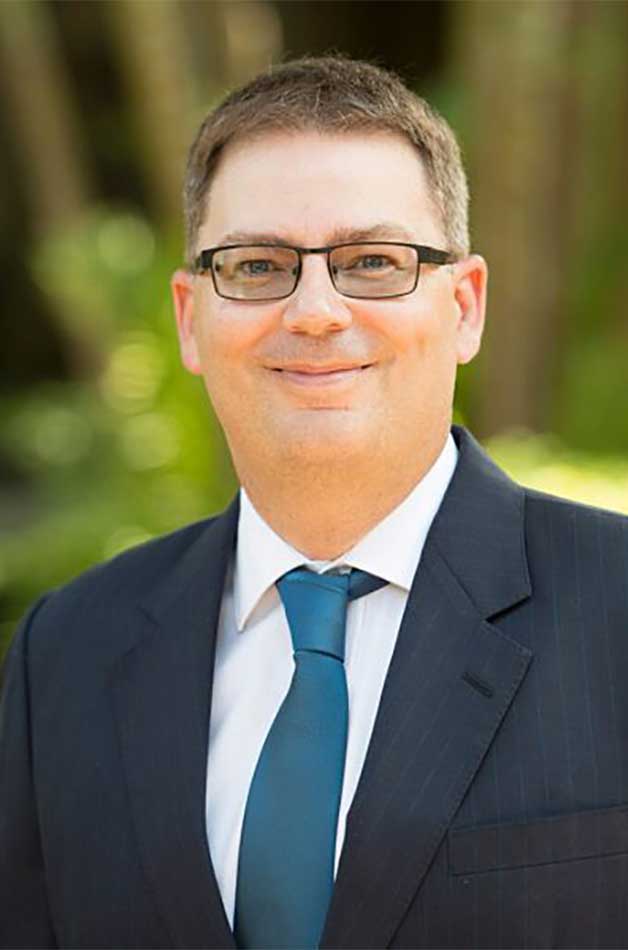
I was in the airline industry when September 11 happened. I thought that was the greatest change I would ever have to deal with, but that pales in comparison to what has gone on in health during this period of time. It’s not comparable.
Like anyone, we were hearing the rumblings in January. We had initial meetings that very much addressed the fact that this may not be great.
In February it got real. That was when we started to think about what we might do, and by March it was all hands to the deck.
In the early days of the Australian experience we were tracking about two weeks behind some of the European experiences, which were unbelievably scary. All of the stats were plotting a trajectory that looked like the UK and Italy. All of the information that we were receiving from Queensland Health, federal, state, industry bodies was: ‘Brace yourself guys, this is going to hurt.’ We were all waiting for the sword to drop, and every day that went past wasn’t one when you thought that you had dodged it but more that you had another day to prepare for when it did happen.
We were preparing for a cataclysm and expecting that all of the normal necessary supplies would not be available. In our hospital we have automatic hand sanitiser units every three or four metres and suddenly within a week that product disappeared off the shelf. So much of what we rely on is what the general community was desperately trying to get themselves. Hand sanitiser, toilet paper, all those types of things.
We started to make some really significant changes and upgrades. We realised that hand sanitiser would likely become completely unavailable. If it hit Australia like we thought it could, there would be none available, whoever you were.
We started to put sinks into our corridors so we could start using soap again. We raided hotel supplies to make sure we had enough single-use soaps so that we could continue to keep good hygiene.
There would not be a facet of this hospital that has not changed due to COVID-19. From how we prepare meals to how we run groups, how we do consultations with our doctors. Everything has changed. Everything.
The March/early April period was an extremely challenging time. Talking among all of my peers and our CEO, we weren’t sleeping. We were working all of the hours that were available.
I still don’t believe how well Australia has done. This was an unfathomable scenario based on what we were seeing earlier on. This is just unbelievable. We were just buying days when we could get a bit more stuff in place. It showed to me that the people who work in health do so for a very particular reason. It’s their nature, so it was rewarding from that sense.
I missed only one lesson with John because he said to me, ‘You need this,’ and I did. I turned up one day and he looked at me and said, ‘You look like crap.’ And that was a really accurate summation of where I was at.
We tried to hit golf balls and I just couldn’t hit a golf ball. Mentally I just didn’t have the capacity to hit balls.
I’ve always been a hacker. I love my golf – it’s a great relaxation for me – but I didn’t particularly care that I wasn’t any good.
The past three months have shown how unbelievably important golf is to me. It was that guaranteed pattern to my week. It was something that I did before work so it was always easy to achieve.
Golf makes you concentrate. If John’s trying to teach me how to swing on an in-to-out path, I really can’t be thinking about whether or not we’ve sorted out the laundry issue at the hospital. My brain isn’t good enough to balance five different thoughts in my head. It was a total switch-off for an hour and something that I could think about in the back of my mind for the next few days.
Golf has this social aspect to it, which is exceptionally good for your mental well-being. As you get older it gets harder to make mates, but golf forces you to meet new people and expand your social group week after week.
We had our first four-ball back at the club a few weeks ago and, yes, the flags stayed in and what-have-you but the banter was there. It felt normal again.
Sometimes we can lose sight of just how unbelievably valuable that social interaction is for us. Those are the things that we need and the loss of those social norms is something that will have a lasting effect on the population the longer this continues.
Not in my wildest dreams did I think Australia would be in this situation. It’s a combination of luck, damn good leadership and having some of the right precautions in place at the right time. But I think a big part of it has been luck.
Stephanie Kyriacou
rookie professional, Sydney
On February 23, Sydney amateur Stephanie Kyriacou won the Geoff King Motors Australian Ladies Classic Bonville tournament by eight strokes. With victory securing a card on the Ladies European Tour for the next two years, Kyriacou turned professional the next week and made her pro debut at the Women’s New South Wales Open at Dubbo Golf Club. She hasn’t played a professional event since.
Two weeks after making my professional debut in Dubbo I was supposed to go to Saudi Arabia for my first event on the Ladies European Tour, but a couple of days before we were supposed to fly out they cancelled the tournament.
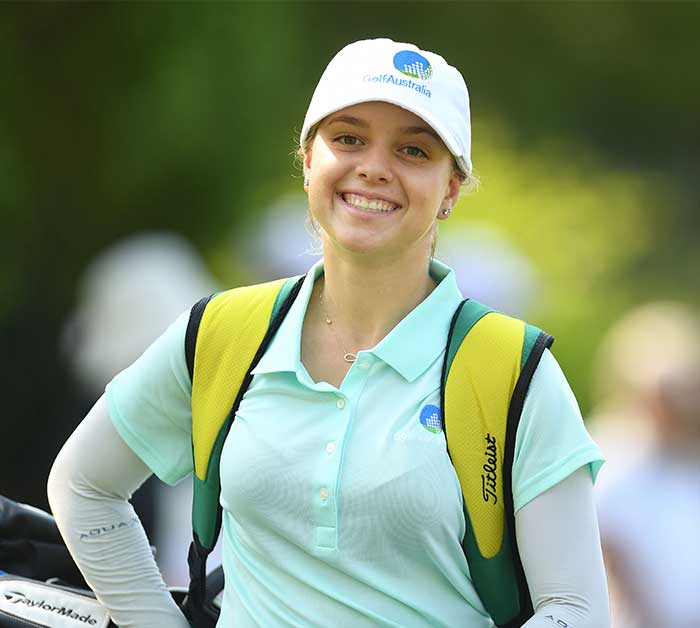
Even before it was cancelled, the tour had sent e-mails saying that crowds would not be allowed. At that point I was starting to think they should just cancel the event, which they did. And then they started cancelling everything else.
I honestly don’t think I’ll get to play another event this year. I had a conversation with Dad and with my coach, Gary Barter, and Gary said early on that there was an 80 per cent chance I wouldn’t be playing anything for the rest of the year. That was hard to hear but it’s still a good time to keep getting better.
I actually feel very fortunate with the way things have worked out, as weird as that might sound. Winning got me status and allowed me to turn professional, whereas friends of mine, like Grace Kim, now have to wait another year before she can turn pro and go to Q-School.
I wouldn’t want to be amateur for another year because when you’re ready to turn pro you just want to start playing in pro events and testing yourself at that level.
I’ve been playing tennis and getting back into gymnastics and it’s only been fairly recently that I’ve started doing a lot of lessons with Gary. I want to learn as much as I can and spend this time practising and trying to get better. When tournaments do start up again, I want to have all these extra shots and be confident enough to play them in competition.
I’m learning so much at the moment and it keeps practice exciting rather than just hitting ball after ball on the range.
Thankfully because we’ve still been able to get out on the golf course we’ve been able to have some competitive practice matches. A few of the boys at St Michael’s Golf Club have put together a mini-tournament called the Pineapple Cup, which is a round-robin matchplay competition for 12 people. I’m the only girl playing, but that’s really good for me because men tend to be more creative on the golf course. They want to try all these different shots so playing with them is really good for my development.
Once the Pineapple Cup is finished, we’re going to have another one and call it the Glen 20 Invitational.
There have been quite a few money games going on as well. I’ve played against Travis Smyth a couple of times. I beat him once but we weren’t playing for anything that day, which sucked.
I’ve got some new equipment too, so this time has given me a chance to get used to the new clubs in my bag. I’ve played Titleist gear for ages and I got the new SM8 wedges – the raw ones, the ones that rust – because they look so cool. I got a couple of new hybrids, a new 3-wood and I got a 3-iron for the first time. It’s like a driving iron and I’m hitting that a lot better than I thought I would. I didn’t think I’d be able to hit it but it’s actually pretty easy.
Even if the LET does put on events this year I probably won’t go. The way I see it, I would need to go over and quarantine for two weeks and then have an extra week to practise and then self-isolate when I get home again. I don’t even know whether I’m able to do that with the government restrictions.
All the status that players have this year carries into next year regardless of whether tournaments go ahead, so my two-year exemption will effectively start next year.
I’ll just focus on developing my game as much as I can so when 2021 comes around and I head overseas, I’m ready to go.
Emma Beauclerc
Director, golfOZ Tours, Gold Coast
Few industries have been more affected by the restrictions imposed by the coronavirus lockdown and border closures than the tourism industry. golfOZ Tours operates tours on the Gold Coast, Sunshine Coast and in Brisbane but the timing of the pandemic means the company is facing a cashflow crisis that could stretch well into next year.
The ironic aspect to all of this is that when the COVID outbreak started happening overseas, we thought we would have a bumper year courtesy of all the domestic travel that would happen.
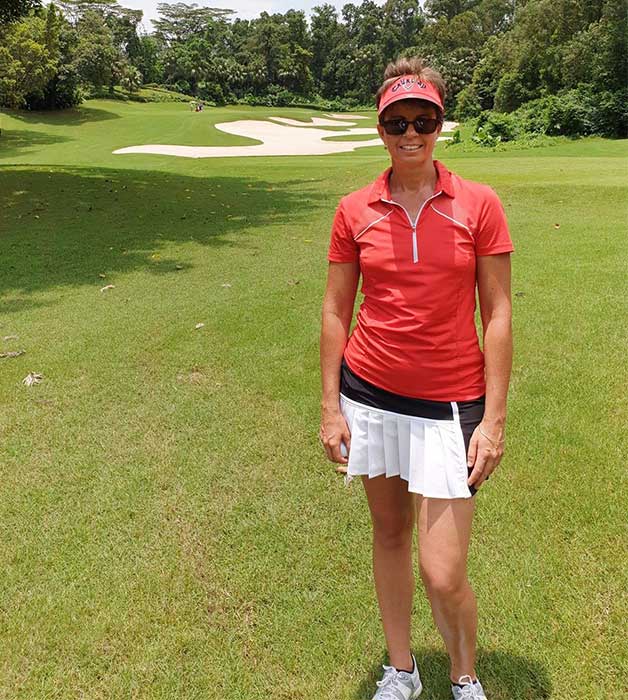 The cancellations started happening in that second week in March. I actually talked one group out of coming up. They were supposed to come to the Sunny Coast for a trip starting Saturday, March 21, and I rang them on the Wednesday. I just had this feeling something big was going to happen over the weekend and that they would have issues going home.
The cancellations started happening in that second week in March. I actually talked one group out of coming up. They were supposed to come to the Sunny Coast for a trip starting Saturday, March 21, and I rang them on the Wednesday. I just had this feeling something big was going to happen over the weekend and that they would have issues going home.
On the Saturday when they were supposed to fly up everything was still fine and then on the Sunday the Government announced the travel bans. The guy organising that group rang me that night and said, ‘I love you, darling.’
To this point I have cancelled 65 groups of golfers of between eight and 24 people and refunded $200,000 in deposits because I wanted to do the right thing by our clients. We’ve refunded everything that we possibly could on the basis that we were doing the right thing and that our clients – many of whom come year after year – will be better placed to come back again next year.
We have a massive contingent that come up in May and June every year. That constitutes a third of our annual turnover and another third comes in July and August. That looks like being a complete write-off as well.
We will get through this, but every business has overheads. I’ve had to put loans on hold because we’ve just traded out of three months with no business.
Initially I thought that we would see a boost in domestic travel once the borders open up again, but now I’m not so sure. People just can’t afford it. One in three people are sitting on JobKeeper. I would estimate that half of Australia will be OK financially and job-wise, however the other half will not.
I had a group of 28 booked in for June and asked them to come back later in the year but 20 of them have since lost their jobs. I can’t expect those guys to come away on a golf trip. I refunded the $200 deposit each of those guys had paid because they need that money right now. The organiser thinks at this stage only 12 might be able to make it back next year.
Even little things can have a big impact. Prior to what would have been our busy season, I had all of our vehicles scrubbed, polished and serviced. They’ve now sat dormant for three months, while still having to pay for all the accreditations, registrations and six-monthly transportation checks. They will need to be overhauled again before we send them back out.
I’m hoping that after July 10 we will be able to have interstate visitors come to Queensland and we can start booking tours again for the weekend of July 18, but at this stage most of my July groups have cancelled.
All of our Kiwi clients tend to come for 8-10 days in larger groups from the end of July to September, and while they are still very keen to come, it depends on whether they will be allowed into Australia.
On Friday, July 31, I’ve got six groups booked and they all still want to come. And we really want August to go ahead. If we get August then I’m taking 80 golfers out to golf every day. That’s 80 people going for breakfast in cafés every morning, 80 people going out for dinner at night and 80 people enjoying the Gold Coast winter weather and everything it has to offer. August is a big month for us, it always has been.
The golf courses I have spoken to in Queensland have been busy with existing and new members during the April-June period, but they are also missing out on the discretionary spending that tour groups bring. I would estimate that the guys who come on my tours spend between $50 and $100 per person, per golf course, per day. That’s an income stream that has dried up completely for courses as well.
The only comfort we can draw at the moment is that 90 per cent of our winter business is repeat business and they have all said they will be back next year, and they will be. In my heart, I know each of my regular repeat tours will be back in 2021 (and hopefully a heap of newbies, too) but I know quite a few of the groups will be fewer in numbers due to financial restrictions.
Adam Smith – Teacher in Charge of Golf, Como Secondary College, Perth
A golf school that boasts Major champion Hannah Green as a former pupil, Como Secondary College in Perth uses Collier Park Golf Course as its predominant training facility. With students unable to leave school grounds, their coaches found innovative ways to continue their golf development.
The school always emphasises a desire to keep things as normal as possible and obviously that’s not always been easy to achieve in the circumstances of the past couple of months.
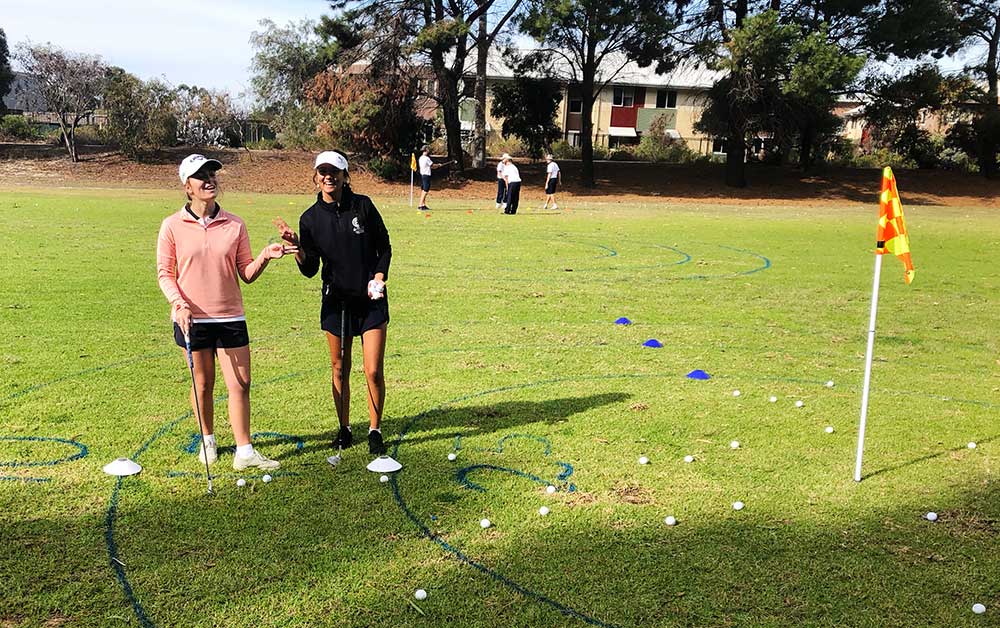
We have 48 students in the program from Year 7 to Year 12 and we’re very fortunate that we have a golf program that gives the students the opportunity to get some fresh air, stay active, stay competitive and, most importantly, remain with their peers.
Even though we have been restricted to the oval, a lot of the students have embraced the opportunity not only to work on their game but also to appreciate that golf is a pretty good sport in that it gives us so much. As well as learning how to play, it has essentially taught them life skills such as resilience and patience.
As other sports have had to shut down completely, our golf students have been able to switch on in a competitive sense and switch off from what else might be going on in life.
In a normal school term we have four hours of golf per week, three of which are spent next door at Collier Park Golf Course working with PGA professionals Tony McSkimming and Mark Parry. Even though the golf course remained open for the most part, government COVID-19 regulations meant that the students weren’t able to leave the school grounds. That being the case, we had to adapt and find new ways to continue their development and their learning using the facilities we have available to us at the school.
We’re fortunate in that we have decent-sized grounds and we have been essentially given exclusive use of one of the ovals. What’s been really beneficial for us having to work within distance restrictions of about 130 metres is that the groundsmen have marked out targets on the oval at 25, 50 and 75 metres like you would see in archery or on a dartboard. We’ve been able to use that not only as a development tool but also a skill assessment in terms of getting points depending on where the shot finishes within the target. We’ve even done fun activities like a crossbar challenge from about 50 metres; the kids love that type of thing.
One of our Year 7 students, Bailey Pilapil, was having a good round at his home course at Western Australian Golf Club and he was short of the last green – a par 5 – by 50 metres in three shots. He needed to get up and down to make par and he said that he visualised doing the crossbar challenge to the flag because it was a similar distance. That really helped him.
This time has given us the opportunity to try new and different games and ideas around how we practise. It’s given me an opportunity to try different skills tests, which have worked pretty well. It’s taught us to be flexible and given us an alternative that we can use as wet-weather activities or whenever we can’t utilise Collier Park.
Senior school students were able to return to Collier Park on May 25 and, keeping in mind that we hadn’t been on the range for a good six weeks, the swings of the kids as a collective looked better than they have done for a long time.
We think by refining those swing actions with the pitching and working on particular sequence movements that it has helped their overall long game. They’re swinging with a better rhythm and a better tempo because not only have we been working on technique but the targets on the oval have given them an external focus as well.
We’re very, very lucky that we got back as early as we did, albeit restricted in some ways. The fact that they have been able to get out and swing a club, hit a ball and get back to doing something they love has been critical.
Even though golf courses were restricted to sending out only two-balls for a period, at school we could still send them out in threes and fours on our modified course as long as we applied the social-distancing rules.
Little things like that have such a positive impact on their mental well-being and their performance because they are still learning from each other. I have no doubt it has helped them to settle back into school life quicker than they would have otherwise.
Wade Hooper
PGA Professional, Sunshine Coast, Queensland
Two years ago Wade Hooper and his wife Fiona – a qualified osteopath – packed up the caravan and offered their services in remote communities throughout Australia. For Hooper, it opened his eyes to the possibility of coaching remotely, the COVID-19 pandemic prompting the launch of ‘Lockdown Golf From Home’ and a more interactive coaching alternative.
I spent six years working in the mines at a little town called Roxby Downs in South Australia. I was doing some golf coaching on the side at the mines, at Port Augusta and some junior clinics across the Eyre Peninsula.
West of Adelaide, past Clare, there is basically no golf pro. My wife Fiona and I got to talking and thought that we could travel across Australia and offer our services in remote country towns. We bought a caravan and went through South Australia, did Western Australia, up around to Darwin and then back down the middle of the country. My idea was to create a bit of a spark for each golf club I visited by offering clinics to juniors, ladies and beginners and empowering the people at those clubs to encourage people and keep that interest up after I’d left.
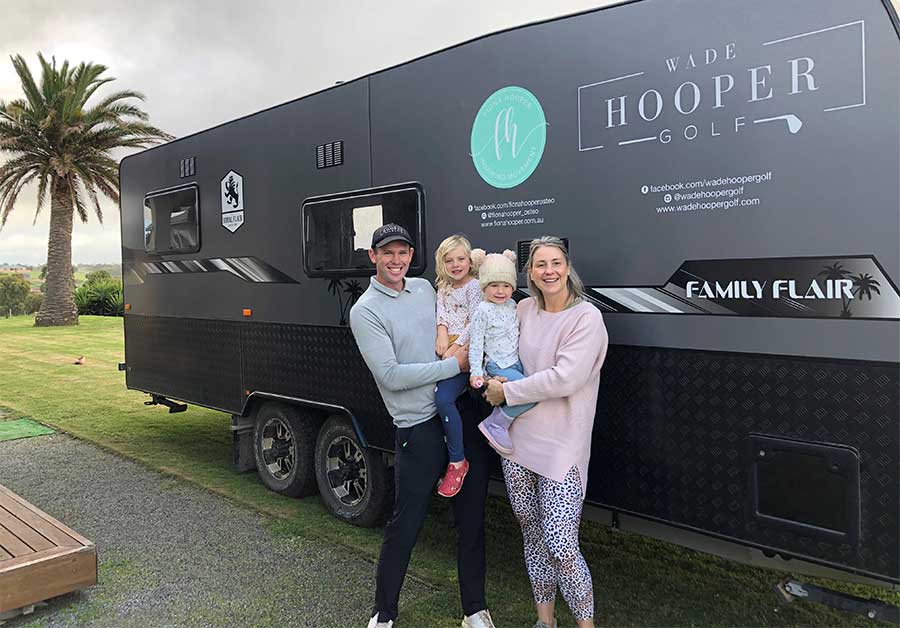
As we travelled around I started to realise that people could practise anywhere and I could give a lesson from anywhere. I gave one kid a lesson by hitting rubber balls into the side of the caravan; another guy I gave a lesson to on the beach. I even gave a lesson in the carpark at the Prairie Hotel, which is 500 kilometres north of Adelaide. There was a guy in WA who I started working with remotely and he started to get really good results.
That’s when I woke up to the possibilities.
When the coronavirus outbreak first started it felt like golf lessons weren’t the most important thing in the world, but as it went on it was obvious people were looking for things they could do at home.
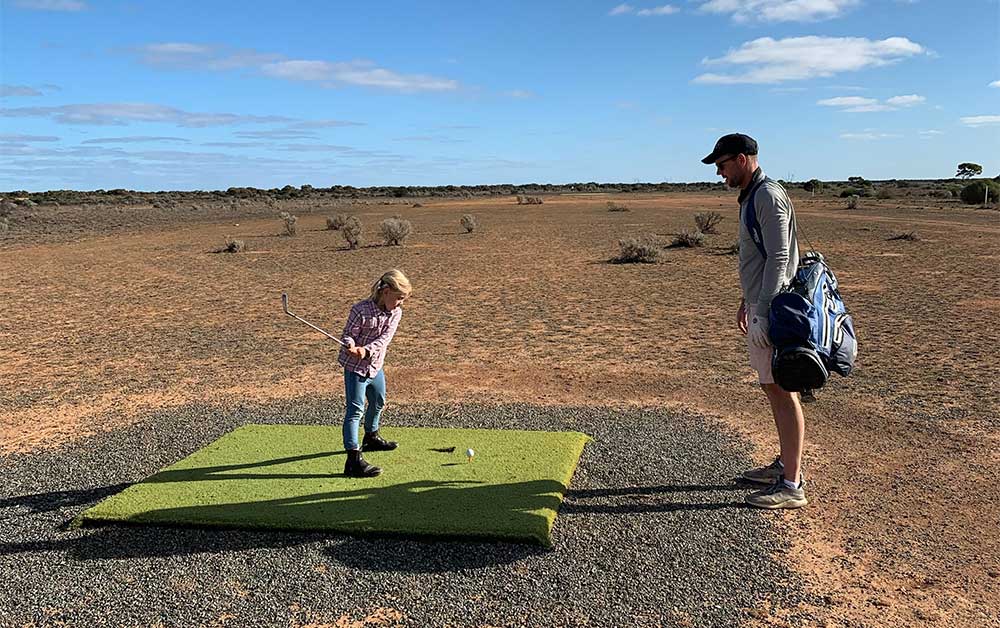
We launched ‘Golf Lockdown From Home’ on Facebook and while I would have liked to come up with a sexier name, people understood what we were offering. Over 12 weeks they can gather information, I send them videos and they can really immerse themselves in what we’re doing and wrap their head around it. They’ve got the feeling that someone is providing ongoing support rather than a 20-marker watching videos on YouTube and trying to figure it out for themselves.
I ask the students to do 20-minute training drills from home three times a week and I find that live videos work really well. We would do a video at 6pm at night, they can ask questions and make it interactive. Through doing this they have created friendships within the group.
We’re breaking a paradigm of belief where people think that they need to see you in person and the instructor needs to be able to physically put you in position. You’re breaking that belief and it is a process. I use Skillest and it is up to us as the golf instructor to remodel coaching. We are pioneering this in many ways but the average golfer who hears about an ‘online lesson’ doesn’t believe they can achieve results that way. People want results and if they can see people getting results with a particular method, they become a little more open to a new idea.
I think this is the future. I don’t like using the term ‘online’ as such; I’ve just got a platform that allows me to coach more efficiently and more effectively. When someone who is past 50 and playing off 17 hears about ‘online’ lessons, the guard goes up straight away so testimonials and real examples of success are important.
I understand that it might not be what every golfer is looking for but if people want to get better through simple instruction that they can work on at home, it’s now available to them. I’m sure as time goes on more will jump on board.



